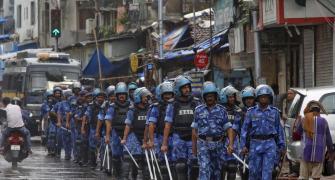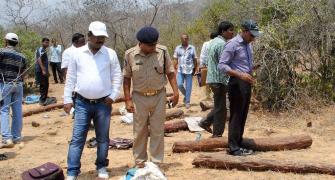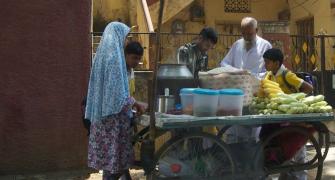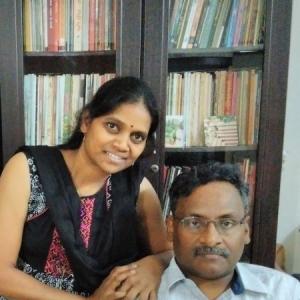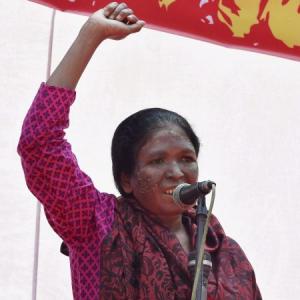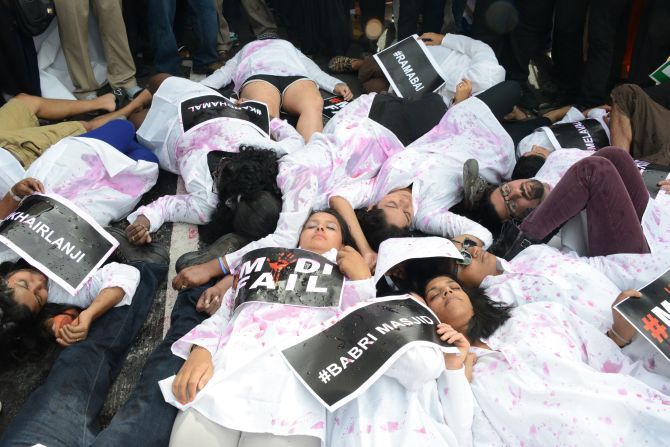
'Human rights violations are there in rural areas and in cities. In rural areas it is crude and in the open. In urban areas it is well hidden.'
'Awareness has grown several fold. India has 160 national and state human rights institutions. No other country in the world has this.'
'Unfortunately the right to association, right to assembly, freedom of expression, right to protest and discuss are all being curtailed systematically one by one.'
Henry Tiphange, an activist and lawyer, will be awarded the 8th Human Rights Award by Amnesty International, Germany, on April 25. The award carries a cash reward of Euro 10,000 (about Rs 7.4 lakh/Rs 740,000).
Tiphange, a founder of People's Watch based in Madurai, Tamil Nadu, spoke to A Ganesh Nadar/Rediff.com
When did you first become interested in human rights?
I got interested after I graduated in 1977. There were floods in Dindigul district. We had gone there for flood relief work. There were caste differences in villages. We were prevented from cleaning wells that belonged to the Dalits. That was my first case. It has been a long journey of 38 years.
My inspirations have been Justice V M Tarkunde, who was president of the People's Union for Civil Liberties, K G Kannabiran of PUCL, and advocates P V Bhaktavatchalam and Dr K Balagopal. They did much more work than me, but never received any awards. I am receiving it in their name.
Over the years, what are the biggest problems you have faced?
In the initial years human rights was a bad word. They treated you like a Naxalite. We had to make the State realise that fighting for human rights doesn't make you a Naxalite.
PILs (Public Interest Litigation) were supported by Supreme Court Justices P N Bhagwati and V R Krishna Iyer. This created more space in society to speak about human rights. Legal aid movements in the country forced courts to look at poor people in jails.
At the grass roots level this helped us a lot. I started with PUCL. I was Madurai secretary and then Tamil Nadu secretary. I learned about human rights from PUCL.
The second World Conference for Human Rights was held in Vienna in August 1993. Lots of NGOs attended. I had the privilege of attending. We heard speeches from people who had come from Africa and Latin America. They spoke about how civil society could make the State accountable.
I came back with that knowledge from Vienna. After that I wanted to become a full time human rights activist.
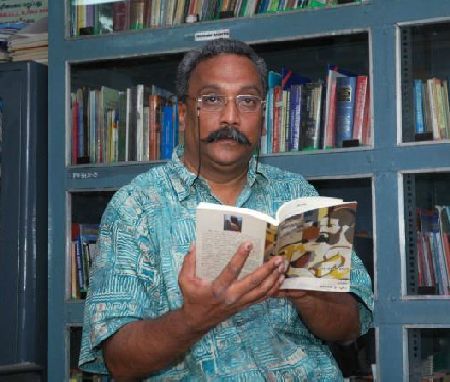 When did you establish People's Watch? How is it funded? How many people work for you?
When did you establish People's Watch? How is it funded? How many people work for you?
People's Watch was started on December 10, 1995. I was one of the founders. One of the notable founders was Father Alexis Diamondraj. I was a practicing lawyer then. Father Alexis passed away on January 1, 1997 and I took over after that. We have 26 members working with us now.
Over the years we have received funds from abroad and the United Nations. The National Human Rights Commission has supported us for specific training. The National Commission for Child Rights gave us funds through the Right to Education Act.
The United Nations Development Programme also gave us funds for their justice programme. We have also received funds from the UN voluntary fund for victims of torture, for rehabilitation of torture victims. Besides this we were supported by the European Union for preventing torture.
France, Germany and the US have helped us to promote human rights education in schools.
Could you tell us about some interesting cases that you have fought and won over the years?
Our success in cases in courts is a very small number. Court-based justice is a marathon. Unless you have the energy to sustain yourself in the marathon, you will never win.
Guruayah died in police custody. His wife was raped in custody. We started the case in August 1998. The case is still on in appeal.
The wife taught me that human rights work is not in court alone. It involved rehabilitation. We educated her three sons. The eldest is now a lawyer. He works in an NGO working with tribals. The younger son works with us. He has completed his master's in social work.
The mother is now a trustee with People's Watch legal body. She is a campaigner now. These people keep you humbled.
We also had a lot of success in the cases against the Special Task Force which was set up to catch sandalwood smuggler Veerappan.
Tell us about your institute that offers training to teachers and also your school human rights education programmes.
We had met women teachers at another training programme and decided to start this. We started with nine schools in Chennai. After that we met the state education minister and told him about it. He said it was too small at that time.
The next year we did 124 schools, it was a two-year programme for Standards 8 and 9. The next step we started a 3-year programme for Standards 7, 8 and 9 in 300 private schools. We used to train the teachers, who in turn taught the students.
SC/ST schools in Tamil Nadu invited us to teach there. This is from among the Tamil Nadu government schools. We covered 350 schools under this. Then we went on to cover all government schools in the state. This we did for 14 years in 3 batches.
In 2005 we went to eight states with this programme -- Kerala, Karnataka, Andhra Pradesh, Pondicherry, Orissa, Tripura, West Bengal and Chhattisgarh.
After that we took the programme to Bihar, Uttar Pradesh, Rajasthan, Gujarat and Maharashtra. Then we conducted the programme in the north-eastern states in 2009.
Totally we worked in 24 states in Classes 6, 7 and 8. We had modules in 9 languages. It created hope in human rights work.
Do you find human rights violations more in rural India or in the cities?
Violations are there in rural areas and in cities. We had done a survey about torture. It is a national phenomenon. In one state the media covers it and in another it is not covered. In rural areas, it is crude and in the open. In urban areas it is well hidden. In numbers they are all the same.
Has the government supported your activities or have you always fought against the government?
When we talk to individual officials about human rights it puts them on the defensive. It is embarrassing to them. In spite of this, they have become my best friends when they realised that I don't have a personal agenda against them.
When you are credible and honest they trust you. You also have to be humble. If you are arrogant, you cannot work in this field.
The award is not for an individual. It is collective work. I have done this work with many others.
People's Watch has lots of dedicated activists who have contributed to this award. It is for all human rights activists in the country.
Unfortunately the right to association, right to assembly, freedom of expression, right to protest and discuss are all being curtailed systematically one by one.
Hope this award and the visibility that comes with it will ensure that Indian philanthropy stands on the side of human rights work.
Have you ever been able to set right human rights violations without going to court, by talking to the people concerned?
We go to court in very few cases. On a lot of issues we have found solutions by talking to people and negotiating with them. People have apologised when we have pointed it out to them. This gradually leads to reduction in the violations.
What are you planning to do with the prize money?
It will be given to People's Watch. We will think of some special project to use it for.
Do you think people are more aware about human rights violations now than 20 years ago?
Awareness has grown several fold. Now people are more aware. India has 160 national and state human rights institutions. No other country in the world has this.
Are violations increasing or decreasing?
The numbers are increasing because people are coming forward to talk about it.
What are your future plans for People's Watch?
People's Watch will now be concentrating on protecting human rights defenders across the country, as attacks on them are increasing.
Why do you think Tamil Nadu has the highest number of detainees in the country?
My own understanding of this is that it has become a weapon in the hands of the district collector and the superintendent of police.
As long as they maintain law and order no one questions them. When they fail to file a charge-sheet they charge them under preventive detention. Advisory boards release most them. The high court regularly strikes it down.
It is usually used when charge-sheets cannot be filed. There is a very poor criminal justice system. The courts process is poor. The Madurai bench of the Madras high court has acquitted so many murder accused as the investigation is shabby.
Doesn't the district collector have to okay it -- if a person has to be arrested under the Goondas Act? Isn't that a deterrent?
That is a deterrent. The collector doesn't have time to read it. Even the most concerned officer doesn't have time to read it. They just sign it. Some collectors apply their mind -- they have it verified independently and have refused to sign. Mostly when the SPs ask, the collectors agree. It is a pattern.
The statistics say that 53 per cent of the detainees in Tamil Nadu are Dalits. What is the reason for this?
This is not shocking. 50 per cent of the prison population is always Dalits and the poor. It is the economic and social poor that are always caught. This is the same in all countries including the United States.
The Kal-Ottars (a caste in Tamil Nadu) now have a union as they are arrested in every case that happens. Even Kerala has many cases against our Kal-Ottars. Now the union will not allow them to be arrested. In spite of that, they are being hounded. More needs to be done.
Among the 1,892 detained last year, 886 were illiterates. Is this true?
50 per cent illiterate -- something is wrong there. Normally criminals are educated at least at the school level. Today criminals are not illiterates. Large sections are very well educated.
Only the high court can release a person detained under the Goondas Act -- how many of these detainees can afford to go to the high court? Do you think poverty is a reason for so many detainees?
Technically, any person in detention should be offered legal help if he doesn't have it. It is very rarely done. The poor cannot afford regular lawyers. Legal aid lawyers are of poor quality. We are a very strange country. Legal aid lawyers are paid a very low salary.
I have worked in legal aid many years ago. They paid me Rs 4,000 a month. At that time the state lawyers were being paid Rs 40,000 a month that is ten times more.
Do you think this law has been used to settle scores with political opponents?
On certain occasions yes, but not generally. The National Security Act is rarely used here, the Goondas Act is used more often. It is not used against political opponents.
In the initial days Dalit Panthers cadre were arrested under the Goondas Act. Now no longer as they are a recognised political party.
After a year are these detainees automatically released or do they have to approach a court?
The advisory board or the high court can release them. Unless there are other cases against them, they will be released after a year. Some are included in another case in the 11h month of detention.
Can the preventive detention period be extended beyond a year?
They cannot be detained for more than a year for the same crime. They have to register another case and file another FIR.
Do you think police officers recommend preventive detention because they are not sure that they can file a charge-sheet within 90 days?
That's always used to prevent the accused from coming out on bail in 90 days. It is definitely one of the reasons. They have to explain the reason for the delay and so this serves their purpose. This is their way of maintaining law and order. Even Uttar Pradesh and Bihar do not do this.
What is the remedy to reduce the number of people arrested under preventive detention? The law is certainly necessary in some cases.
From the civil liberties point of view it is not the right law. The criminal justice system should be good. The prosecutors should be good and the investigation should be good.

